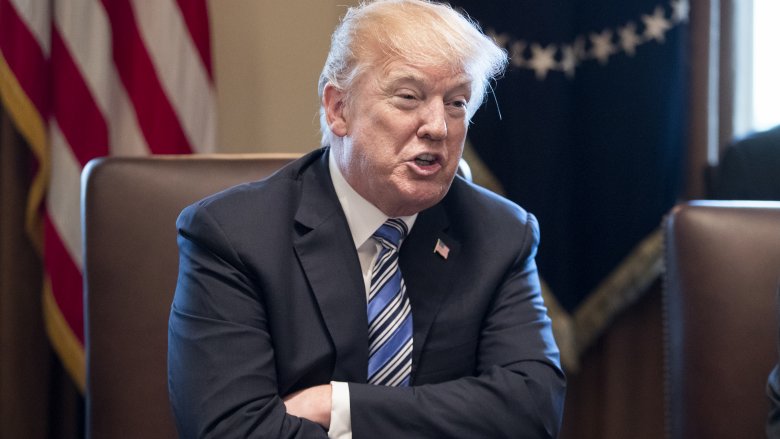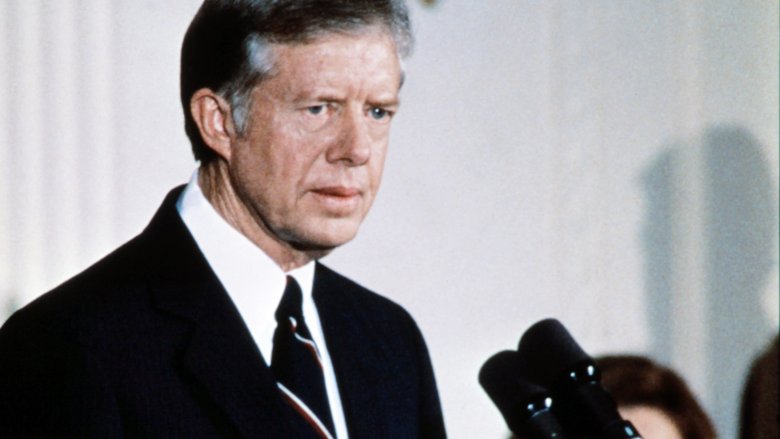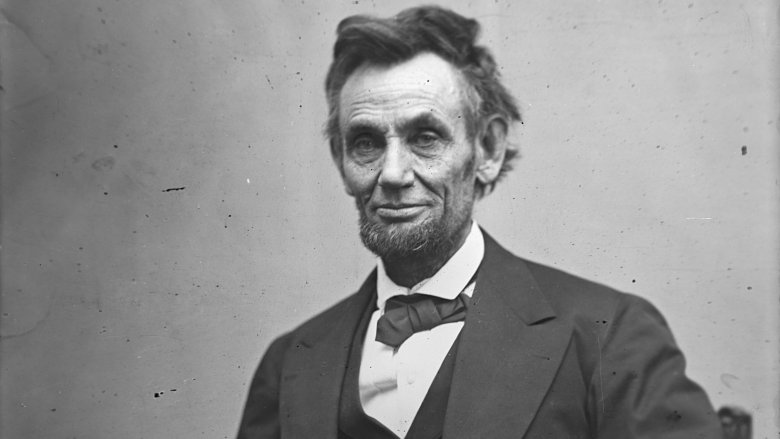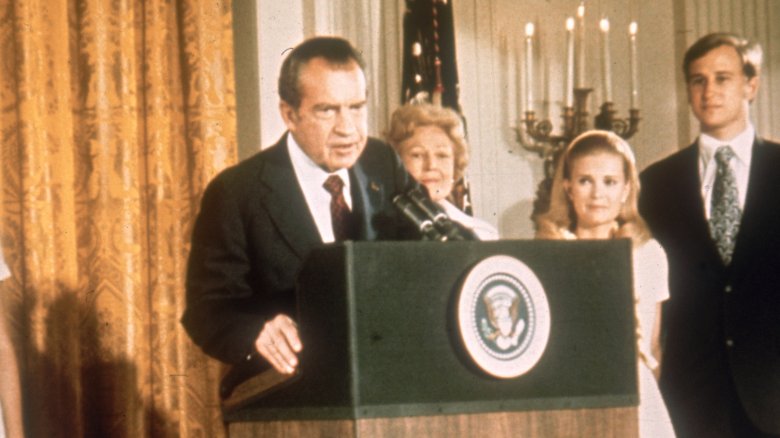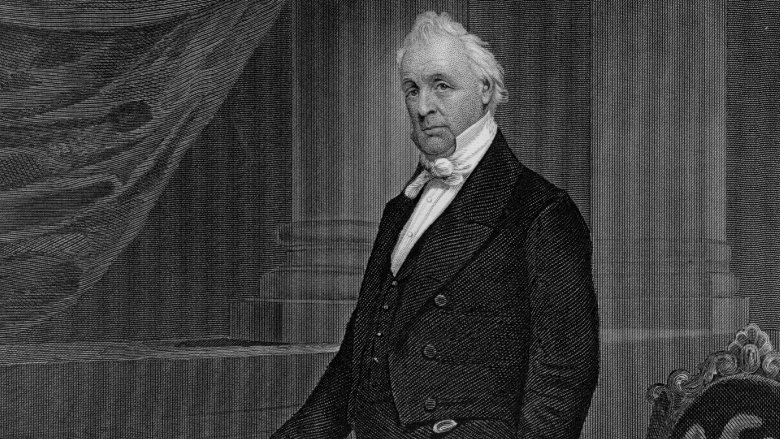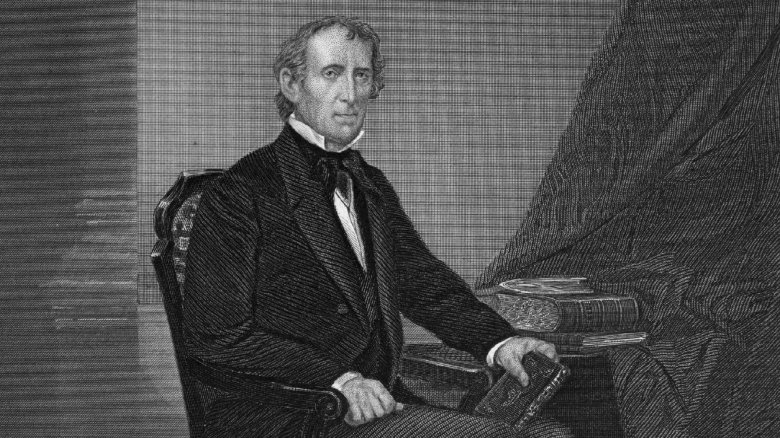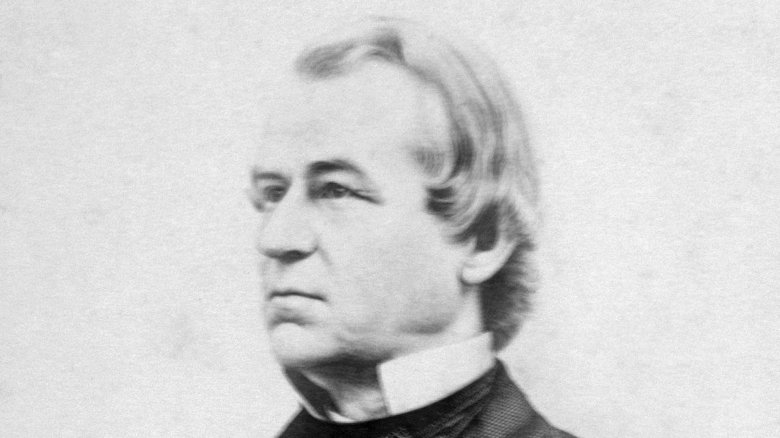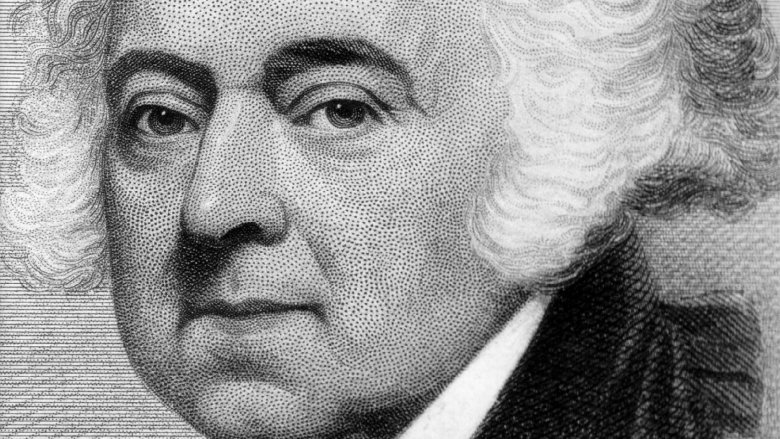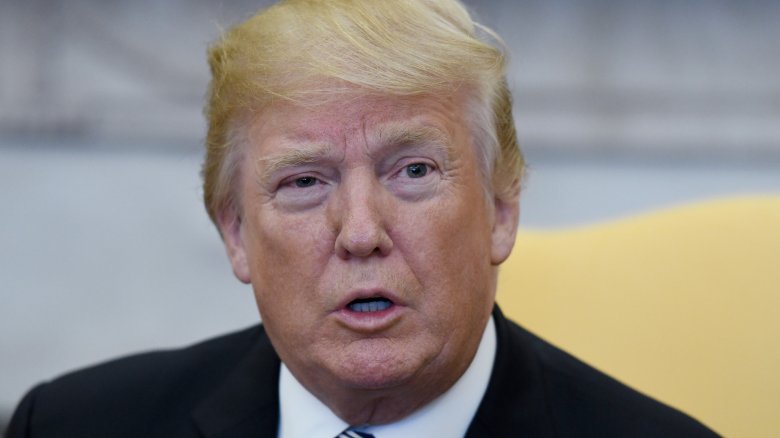Desperate Things Presidents Did To Improve Their Approval Ratings
If you want to know what it feels like to go under the world's biggest microscope, try being president of the United States. Every single statement, decision, donation, or casual gesture that any president makes will be analyzed and dissected by millions of people, and quite often, those people are going to be harshly critical, considering the responsibility and authority that a president wields. And hey, that's just the nature of freedom. Being able to openly criticize the president, no matter who they are, is a huge part of what makes the United States what it is.
However, while all presidents have had to deal with controversies, there are some who have battled especially low approval ratings, more intense criticism, or massive attempts to boot them out of office. When these presidents have faced such situations, they've sometimes taken desperate measures in order to win back approval ... and often, this hasn't turned out so well.
Gerald Ford tries to WIN ... and loses
Sworn in right after the Watergate scandal blew up, Gerald Ford's presidency got off to a rocky start. His decision to pardon Richard Nixon won him a lot of enemies, and according to the Miller Center, he wasn't helped when a popular Saturday Night Live spoof portrayed him as a klutz. However, the real cause of Ford's low approval ratings was massive inflation, which climbed an eye-watering 8 percent. Anxious to turn his popularity around, Ford threw together a heavily promoted anti-inflation campaign called WIN: "Whip Inflation Now." Catchy, right? Ford certainly thought so, and the administration rapidly mass-produced WIN-themed products, as seen in the Ford Library Museum, including stickers, footballs, and most significantly, WIN buttons. After all, who didn't want to whip inflation?
Well, when you use a catchphrase like WIN, you better make sure you actually win. The comedic potential was too thick, and according to AdAge, the WIN campaign was widely ridiculed. Comics and talk show hosts thought the whole thing was hilarious. Newspaper headlines played around with the slogan, as seen in the 1974 "WIN is losing" edition of the Lakeland Ledger. Perhaps most damaging of all was when critics started wearing WIN buttons upside-down, a statement that history professor Yanek Mieczkowski says was started by press secretary Ron Nesson. Doing this turned WIN into NIM: "No Instant Miracles."
George W. Bush messes up with Katrina and then messes up trying to fix it
George W. Bush scored record-high approval ratings in the time immediately following 9/11. However, the rest of his presidency was plagued by low ratings, as reported by Gallup, and the administration's handling of Hurricane Katrina is often cited as one of the lowest points. When Katrina smashed into New Orleans in 2005, Bush was enjoying a 29-day vacation at his ranch in Texas. According to U.S. News, Bush's aides chose not to inform the president of the disaster for an entire two days, not wanting to disturb him from his leisure time, until it reached such a catastrophic level that they felt it necessary to brief him. Bush immediately cut his vacation short and hurried back to Washington, flying over the wreckage of New Orleans on his way home. In an attempt to fix his PR problems, Bush agreed to be publicly photographed in Air Force One, grimly looking down over the Katrina disaster from the airplane window.
The administration hoped these photos would look serious, concerned, and presidential, thereby reversing all the criticism that had been directed at Bush. Instead, the photos had the opposite effect, with critics roaring that Bush looked "detached and uncaring," as if he was "above" the disaster. As noted by the Washington Post, Bush's ratings continued plunging in the month afterward. In Bush's presidential memoir, Decision Points, he wrote that he regretted those photos very much.
Jimmy Carter passes legislation he really, really doesn't like
Despite beating Ford in 1976, Jimmy Carter soon proved to be a fairly unpopular president, whom History describes as having such "sagging approval ratings" that his reelection campaign even faced a challenge within the Democratic primary, courtesy of his old foe Edward "Ted" Kennedy. Though Carter beat out Kennedy in the primary, he still faced a tough election ahead, with a struggling economic record and a 1979 hostage crisis for which the general public judged him harshly.
With the final election against Ronald Reagan looming ahead of him, Carter continued facing criticism on both the right and the left. According to University of Missouri history professor Robert M. Collins, the president's advisers pushed him to approve a tax reduction and moderate spending program that he had previously been "adamantly against" but which now seemed necessary to keep from being "savaged politically." Carter was clearly uncomfortable with the program, and his gesture was largely interpreted as a way of pandering to the masses. It didn't save him, as the 1980 election ended up going to Reagan.
Lincoln makes a huge effort to talk the South out of seceding
Sure, these days, Abraham Lincoln usually scores a top spot on most people's lists of favorite presidents. But back in his day, Lincoln's anti-slavery views — which evolved quite a bit over the course of his presidency — were seriously controversial. Though Lincoln didn't begin his political career a true abolitionist, according to History, Lincoln's campaign for president drew fierce criticism from the Southern slave states, who were familiar with Lincoln's history of outspoken criticism against slavery. When Lincoln won, the South rebelled, and in the brief few months between Lincoln's victory and his inauguration, seven states had already seceded from the Union.
History says Lincoln was deeply troubled by the growing split within the country, and so in his inaugural address, Lincoln desperately and firmly pleaded with the Southern states not to leave: "We are not enemies, but friends. We must not be enemies. Though passion may have strained, it must not break our bonds of affection. The mystic chords of memory, stretching from every battlefield and patriot grave, to every living heart and hearthstone, all over this broad land, will yet swell the chorus of the Union, when again touched, as surely they will be, by the better angels of our nature."
However, Lincoln's effort didn't work. The Southern states became the Confederacy, and within weeks, the Civil War broke out.
Nixon gets desperate, fires everybody
As History explains, the Watergate scandal began in 1972, when President Richard Nixon — who was running for reelection — hired five operatives to wiretap the headquarters of his opponent's committee, stationed in the Watergate complex. The operatives got caught, and the ever-paranoid Nixon swiftly denied all involvement, managing to win the election anyway. However, the evidence continued piling up, and Nixon's ratings plunged into the toilet.
Nixon kept lying, but the investigation became big news. Special prosecutor Archibald Cox continually called for Nixon to release the White House tapes that would prove the president had ordered the Watergate bugging. Nixon knew if the tapes got out it would mean the destruction of his reputation, the end of his presidency, and probably criminal charges.
Like a cornered animal with nowhere to turn, Nixon lashed out. On one Saturday night, according to Politico, Nixon ordered his attorney general, Elliot Richardson, to fire Cox and sweep the whole situation under the rug. The attorney general refused, choosing to resign rather than follow the order. Then Nixon pressured Richardson's deputy to fire Cox, and the deputy resigned as well. Nixon finally got the solicitor general to do the deed, and Cox was removed, but it came at a heavy cost: Nixon's cover-up had inflamed the general public, and the Congressional investigation picked up steam. This one night of desperation would go down in history as the "Saturday Night Massacre."
Buchanan writes a self-aggrandizing memoir to make himself look better
It's been over a century since James Buchanan was president, but he still gets slammed by historians pretty regularly, with Business Insider even calling him "one of the worst US presidents in history." Buchanan was the immediate predecessor of Abraham Lincoln, and Buchanan is infamous for his colossal failure to prevent the United States from ripping in two due to his continued support of the Southern slave states in all major decisions. Basically, as History explains, Buchanan left Lincoln with a huge mess to clean up, and nobody was happy about it.
So Buchanan wasn't exactly beloved in his time, and that's why only a few years later, he went to work on what would become the first official U.S. presidential memoir, Mr. Buchanan's Administration on the Eve of Rebellion. As Mental Floss points out, Buchanan's memoir is basically a pleading attempt to rewrite history, with Buchanan justifying all of his decisions in office, even trying to draw comparisons between himself and the now-popular Lincoln. Buchanan certainly hoped history would one day look back on his administration more fondly, but historians haven't taken the bait yet.
John Tyler made Texas into a state
These days, we're used to the idea of the veep being a "heartbeat" away from the presidency, but when President William Harrison died in 1841, the proper order of succession was not entirely clear, according to the National Constitution Center. Sensing a great opportunity, VP John Tyler aggressively jumped into the role of president, establishing the so-called "Tyler Precedent." Most people are okay with this format now, but at the time, Tyler's power grab angered a lot of people, who began referring to him as "His Accidency." According to Mental Floss, even Tyler's own party, the Whigs, were so unimpressed that they expelled him from the party. To top it off, almost everyone in his cabinet resigned on him. Ouch.
Seemingly blind about how disliked he was, Tyler still really wanted to win a second term, maybe to shut down that "Accidency" nickname once and for all. According to historian Edward P. Crapol, Tyler was advised that if he could successfully incorporate Texas into the United States, a second term would be assured. Tyler promptly made the annexation of Texas his primary objective, devoting blood, sweat, and tears to the challenging task.
In the end, Texas did become a state, but Tyler's popularity didn't improve, and he ended up withdrawing from his own reelection campaign. Years later, when the Civil War broke out, Tyler joined the Confederacy and was branded a traitor.
Andrew Johnson blames the 'mendacious press' for making everyone hate him
Generally known for his abrasive personality and his extremely racist views, Andrew Johnson was the VP who took over after Lincoln's tragic assassination. Johnson rapidly gained the loathing of the Northern states — and Congress — because of his push for policies that put the South back in the hands of the former white slaveholders, according to the Smithsonian. Johnson's popularity continued to nosedive when he decided to fire Secretary of War Edwin M. Stanton, which led the House of Representatives to vote for Johnson's impeachment.
The impeachment proceedings were a massive event, unlike anything that had ever happened before. The whole thing was so publicized that regular people even purchased tickets to watch the trial. In the midst of all the commotion, according to Chester G. Hearn's The Impeachment of Andrew Johnson, Johnson tried to fix all his bad PR by giving a public speech accusing the "mendacious press" and a "subsidized gang of hirelings" for unfairly destroying his reputation. In the end, Johnson was not convicted, and he finished his term, though history has not looked back too fondly on him.
John Adams tries to destroy Thomas Jefferson's reputation
Presidential elections are nasty public events, full of mean insults and vicious put-downs. This tradition started with the election of 1800, where incumbent president John Adams ran against his former friend Thomas Jefferson. If you thought these old elections were soft, gentlemanly affairs, or that today's elections are nasty ... well, let's just say the aggressiveness of the founding fathers makes today's elections look like delicate slap fights in comparison, according to the Miller Center.
See, as he ran for reelection, John Adams wasn't a popular president. Following George Washington wasn't easy, and Jefferson was pushing hard to get Adams out of office. In response, Adams viciously cut into Jefferson's reputation with insults and slander. According to CNN, Adams once tried to hit Jefferson's reputation with the rather racist description of Jefferson as "a mean-spirited, low-lived fellow, the son of a half-breed Indian squaw, sired by a Virginia mulatto father." Adams also claimed Jefferson was an atheist, and even argued that Jefferson performed bizarre, ritualistic medical experiments on live animals at his home in Virginia.
But don't think Jefferson was a victim, either. At one point, he called Adams a "hideous hermaphroditical character." The difference was that while Adams spat his own venom, Jefferson hired a professional to do his mudslinging for him, and won the election. Despite all the insults, Adams and Jefferson went on to reconcile their friendship in the years afterward.
Trump redefines reality
Every president has to deal with low approval ratings now and again. The United States has often been a politically polarized country, but more importantly, it's a country founded on the principles of democracy and republicanism, where people are given the freedom to always criticize their appointed representatives if they feel they're not doing the job correctly. Pollsters do their best to gather balanced, unbiased approval ratings and ask questions so surveyed individuals can freely express whether they feel positively, negatively, or neutrally about the subject being polled. Approval ratings tend to ebb and flow with every presidential decision, with some presidents earning higher ratings than others.
When 2017 polls indicated that President Donald Trump's approval ratings were hitting a historic low, according to the LA Times, the president fired back on Twitter, writing that "any negative polls are fake news," an accusation which seems to refute the possibility that a negative poll could ever happen, even though almost every president has received middling-to-low ratings at some point or another. Of course, based on what we know now, the opinion polls aren't any more fake than the election was, in which Trump definitely won the electoral college but definitely lost the popular vote. You win some, you lose some, Donnie!
